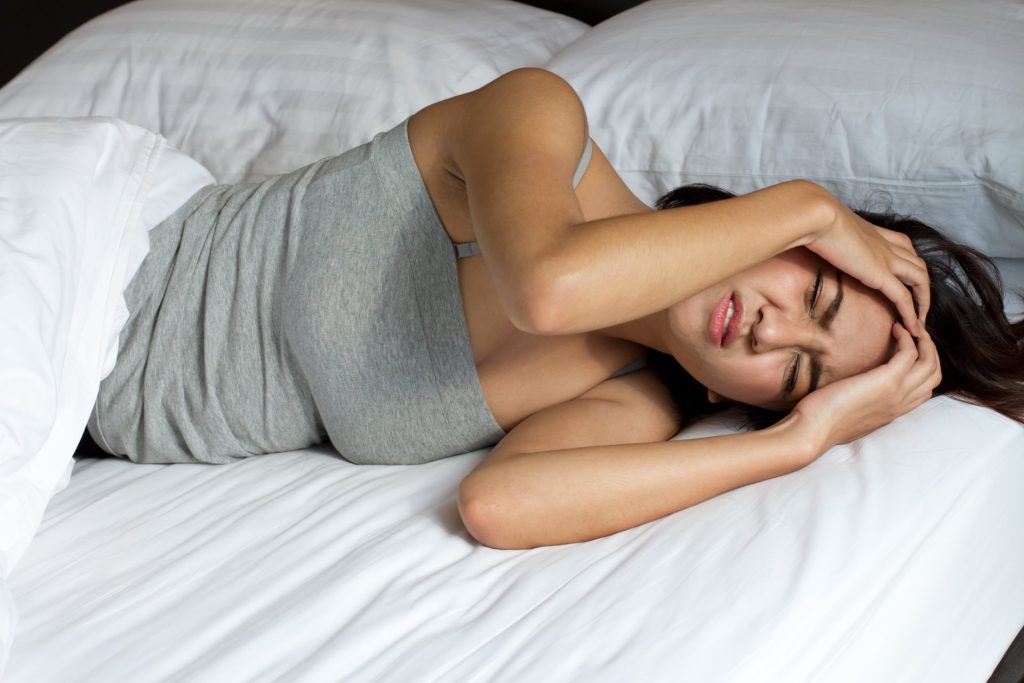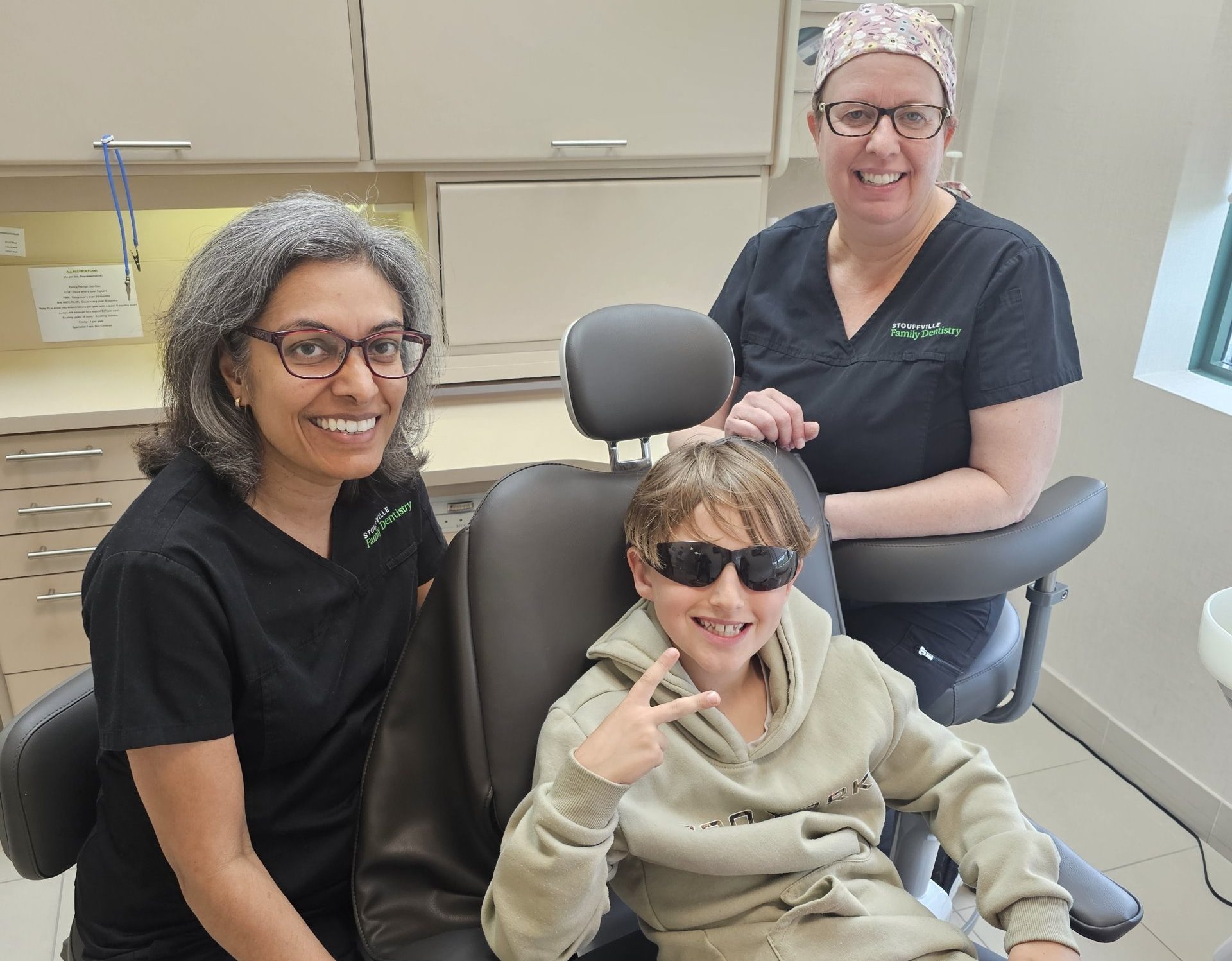What Is Sleep Apnea — In a Nutshell
We all know how important a good nights rest can be. It’s the first step to a productive, successful and happy day. But what if you aren’t getting the absolute best sleep you can get? This is true for many people that have a condition known as sleep apnea.
Sleep apnea is a sleep disorder where your airway becomes partially or fully blocked during sleep, causing you to stop breathing momentarily. This can happens hundreds of times during the night and prevents you from achieving deep and restorative sleep.
Over time, these interruptions can affect your physical health, memory and energy levels. It can also take a surprising toll on your teeth, jaw, and overall oral health. Let’s take a look into how these connections work, what signs to watch for, and what you can do about it.
The Link Between Sleep Apnea & Bruxism (Teeth Grinding)
One of the key links between sleep apnea and oral health is bruxism; the involuntary grinding or clenching of teeth, often while asleep. Studies and clinical observations suggest that when sleep is disrupted (as it is in sleep apnea), the body may respond with jaw muscle activations. Over time, these patterns can lead to habitual grinding or clenching.
In other words: sleep apnea may indirectly trigger or worsen teeth grinding while you sleep.
How Sleep Apnea–Related Grinding/Clenching Affects Your Teeth
When your jaw muscles are working overtime every night, it isn’t just your jaw that “feels it”, your teeth do too. Teeth grinding can lead to the following:
- Enamel wear and tooth flattening. Repeated grinding wears down the hard outer layer of teeth, gradually flattening cusps and making teeth more vulnerable to damage.
- Cracks, chips, and fractures. Microscopic stress from clenching can create cracks over time, and sudden forces can chip or fracture teeth.
- Increased sensitivity. As enamel thins, the inner layers of the tooth (dentin) may become exposed, leading to sensitivity to hot, cold, or pressure.
- Damage to restorations. Crowns, veneers, and fillings can be stressed or loosened by constant grinding.
- Gum recession & bone stress. Indirectly, the forces can promote changes in the surrounding gums and bone over time.
If unaddressed, these issues can worsen, leading to more complex dental care that early treatment could have prevented.
Jaw & TMJ Effects
It’s not just your teeth that take a hit. The constant muscle overuse and jaw pressure can lead to:
- Jaw pain, stiffness, or soreness — especially first thing in the morning.
- Clicking, popping or “locking” of the jaw joints (the temporomandibular joints, or TMJs).
- Chronic headaches, earaches, or facial pain, often overlapping with TMD (temporomandibular disorder) symptoms.
- Muscle fatigue and hypertrophy. Over time, the masseter muscles (which control chewing) can become enlarged or tight.
- Changes in bite alignment. In severe, prolonged cases, wear patterns and shifts can subtly alter how the upper and lower teeth meet.
In short, sleep apnea, teeth grinding, and jaw issues are interconnected, together, they can place strain on your entire oral and jaw structure.
Signs You Shouldn’t Ignore
Here are red flags that might point to sleep apnea affecting your teeth or jaw:
- Worn, flattened, or chipped teeth (especially if there’s no obvious trauma)
- Increased tooth sensitivity or pain
- Frequent headaches, especially in the morning
- Sore, tight, or fatigued jaw muscles
- Popping, clicking, or locking in the jaw
- Loose or damaged dental restorations (crowns, fillings)
- Daytime sleepiness, snoring, gasping or choking during sleep (classic sleep apnea signs)
If you are experiencing any of these signs, Dr. Ali and the team at Stouffville Family Dentistry would be happy to discuss them with you.
What You Can Do (Practical Steps & Prevention)
Fortunately, there are effective ways to break this cycle and protect your oral health — especially with the right dental team and consistent care.
- Sleep study / sleep apnea diagnosis & treatment If you haven’t yet been evaluated for sleep apnea, that’s a great first step. CPAP (continuous positive airway pressure), oral appliances, or lifestyle modifications may reduce airway collapse , reflexive muscle reactions and bruxism.
- Custom night guard / occlusal splint A custom-fitted device can help protect your teeth surfaces and reduce stress on the jaw.
- Stress management & sleep hygiene Relaxing before bed, avoiding stimulants like caffeine and alcohol, and following a calming routine can all help reduce nighttime tension and clenching triggers.
- Jaw exercises & physiotherapy Gentle stretches, massage, and guided movements (under the care of a professional) can relieve muscle tension and improve joint mobility.
- Regular monitoring by your dentist Frequent checkups help us catch early wear, micro-cracks, or joint changes before they escalate into larger issues.
- Bite / occlusion adjustments if needed After assessment, small dental adjustments or repositioning may alleviate stress points, in certain cases.
In Summary
Sleep apnea affects more than just your breathing. Its impact can also extend to your teeth, jaw, and overall oral system. The connection often comes from added stress on the jaw muscles, which can lead to clenching or grinding (bruxism), wearing down enamel, damaging restorations, and straining the TMJ.
The good news is that with early diagnosis, the right dental support, and targeted care, you can protect both your smile and your jaw from long-term harm.
If you suspect sleep apnea, notice unusual wear on your teeth, or have jaw pain, reach out to Stouffville Family Dental. We’d be happy to help you breathe easier and smile with confidence.









